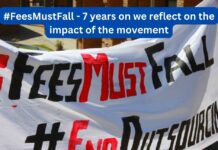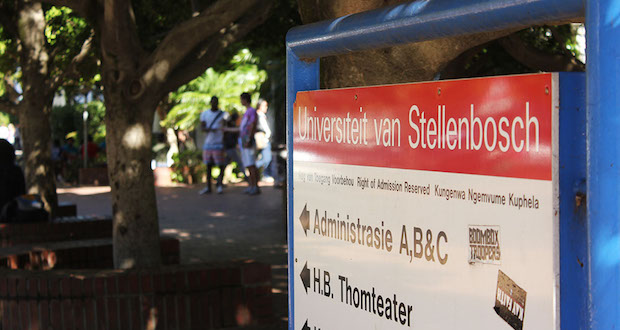Speaking to the media on Thursday, Minister of Higher Education and Training, Dr Blade Nzimande, said he didn’t feel as pressured by the current students’ protest as his intervention has widespread support. Protesting students across the country, however, are having none of it. They believe the government intervention ignores the actual demand of students for free, decolonised higher education. The Daily Vox asked a few academics what they make of the whole situation.
Here’s Professor Lwazi Lushaba, from the Politics department at UCT, on the minister’s intervention.
[dropcap]“[/dropcap]Blade Nzimande’s intervention was the most useless that we have ever received from the Ministry of Higher Education. The recommendations came from the council of universities led by UCT. There is nothing in that suggests that he thought through the issues. He basically said universities can increase fees at a maximum of 8% even though they have had a year to think through the problem.“
A lecturer at Stellenbosch University shared some thoughts.
[dropcap]“[/dropcap]Blade’s intervention was interesting because he is trying to navigate intense politics within the university and the state. We cannot separate the student movement from a crisis within the state or the ANC. Blade may have come with too little too late but I don’t think his idea was entirely unreasonable, we need to address the class question more robustly. It’s not fair to allow the rich and the middle class the same category as the poor.“
We also spoke to Dr Darlene Miller, Senior Lecturer at the Wits School of Governance:
[dropcap]“[/dropcap]I don’t think it is helpful for the university to throw the responsibility back to the education ministry and that the government takes that ball and throws it right back at the universities. I think we have a crisis of leadership where neither senior management of the university, nor the government is willing to lead on how to find a way out of the crisis. They have to exist in a partnership which finds the solution. The students are saying very clearly, “We don’t have money.†The debate is not about how not to increase fees, the debate is that you must open the doors of learning and you must find a way of making that free.â€
Blade: you decide the free increase
Universities: no you decide!
Blade: no you decide!
Universities: no you decide! #Fees2017
— #WokeSocial 25/09/16 (@patson_manda) September 19, 2016
So who exactly is protesting?
Lecturer at Stellenbosch University:
[dropcap]“[/dropcap]It isn’t just students who are involved in this protest. We are talking about a complex assemblage of different groups where only some occupy the typical notion of what a student is. We don’t have an accurate understanding of who is involved or what the message is. One of the difficulties of launching a mass movement is agreeing on what the demands are. Anyone who suggests that the demand is as simple as “free education†is not being honest. The issue is not simply about universities but a deep structural problem in our society that has gone unaddressed for a long time. The university is a much larger symptom of a fracture in society.â€
Dr Richard Pithouse, Politics Department, the University Currently Known As Rhodes:
[dropcap]“[/dropcap]There is a tremendous diversity in what is currently happening. Fees Must Fall doesn’t have a centralised leadership structure that takes collective decisions. It’s a very fluid situation and students have every right to protest for free education. It is a viable goal. That is one reason why students have constituted themselves as a force that can face the system. There are some individuals on campuses who are very hostile and are not willing to change without some kind of external pressure.â€
So what exactly is this protest about then?
Professor Jane Duncan, Department of Journalism, Film and Television at the University of Johannesburg:
[dropcap]“[/dropcap]My understanding of the issue is that it is about demanding that education be delivered as a public good, or as a commons, and not as a commodity. In other words, the profit motive must be removed from education delivery. If it is not, then state subsidy of education for the poor and the missing middle will continue to be huge because the education is still being costed as a commodity.â€
But why shut down the university?
Dr Irma Du Plessis, Senior Lecturer of Sociology at the University of Pretoria, explains the function and limits of a shutdown during a protest against the cost of tuition:
[dropcap]“[/dropcap]Shut downs are highly effective, precisely because many of our campuses are open spaces. The extent to which shut downs are broadly supported, internally and externally really matter. Shutdowns buy compliance rather than consent from those who do not formally support the call or the particular form of protest.†(Editors’ note: adapted from Facebook)
Professor Lwazi Lushaba weighs in:
[dropcap]“[/dropcap]The students have underperformed their response, I would have expected that students would have shut down every university in South Africa after that announcement. We know that the only language that the government understands is that of violence and the vice chancellors respond with private security. Universities are supposed to be thinking spaces where we find innovative ideas to deal with societal problems. What is the difference between our universities and the anti-black government that we have? There is absolutely none.â€
But what can academic staff actually do right now?
Dr Irma Du Plessis:
[dropcap]“[/dropcap]I would want to see broader participation from staff and students and management that reduce direct contact between security or police and student protesters – or in fact the need for security altogether. But a protracted shutdown or strike that is not deeply socially embedded erodes the viability of this possibility over time. When campuses are abandoned but for groups of protesting students and poorly qualified, lowly paid security we have all but set the scene for our worst and most dreaded internal fantasies about vulnerability, safety, fear and threat to play out.â€
Dr Darlene Miller:
[dropcap]“[/dropcap]Our duty as academics of this country is to support the desires of the young people, particularly young black South Africans, to make sure tertiary education, university education, education with a strong philosophical humanity – to make that kind of education available to our students. We are not talking simply of skills-based technical education. We understand that university education is an important base for future taxpayers.“
FHS staff, academics & other UCT members have assembled at the gates of parliament to call on government to #EndTheHigherEdCrisis pic.twitter.com/ICtg1stN3u
— UCT Health Sciences (@UCTHealthSci) September 22, 2016
Surely students need to be realistic. Where’s the money going to come from for this?
Professor Jane Duncan:
[dropcap]“[/dropcap]Many are saying that the student demands are unrealistic, but I don’t believe they are. Rather, leaving society the way that it is, is what is unrealistic. When struggles over how society are organised become generalised, then suddenly what appeared unrealistic a while ago becomes realistic as people are forced to think outside of their narrow (often self-imposed boxes). Power concedes nothing without a fight.â€
Dr Richard Pithouse:
[dropcap]“[/dropcap]A fee-free education is definitely possible and there are various ways it can be achieved, as long as you acquire enough political support. The idea is to get access to the wealth of the national fiscus and invest it in social purposes. I think the state has moved a little bit in response to the pressure. The general tenor to how Blade Nzimande and Gwede Mantashe responded and their praise of authoritarianism is quite disturbing. They really could have engaged students in a much more productive way.“
Dr Nico Cloete, Director of the Centre for Higher Education Trust and Coordinator of the Higher Education Research and Advocacy Network in Africa:
[dropcap]“[/dropcap]The phrasing is wrong: there is no such thing as free higher education. The question is who pays what when and the real question is not feasibility, free higher education will privilege the affluent, so the question is: do we want to make the already most unequal country in the world (Gini-coefficient 0.70) even more unequal?“
[dropcap]”[/dropcap]The media debate has generally been ill-informed. Often overlooked is the evidence that no fees in an inefficient university system characterised by low participation and high inequality will benefit the country’s elite and further dampen the contribution of higher education to development. Nor can universities alone provide the skilled labour needed for economic growth. Structural and funding reform is needed but government does not have infinite reserves. The evidence shows that what is required for equitable and sustainable transformation is a differentiated post-school system, with differentiated funding and fees; an acknowledgement of the trade-offs between participation, public investment and fees in the university system; and a coordinated effort between students and leaders from all sectors to re-establish the university’s role in reducing poverty and driving development.
There is no free higher education in the world. The policy choices concern who pays what when?â€Â (Editors’ note: adapted from CHET.co.za)
Professor Lwazi Lushaba:
[dropcap]“[/dropcap]A fee-free education is most certainly possible, but we cannot depart from the premise of affordability. To educate a nation is not a cost issue but a matter of building a nation. Black people are the majority in our universities who were historically excluded for centuries. Free education would be a way of addressing a historical wrongdoing, it doesn’t negate the white people who can afford varsity fees. We know that they are privileged to own the means of production in this country. We can work out mechanisms around to tax those with historically accumulated wealth.“
 Lecturer at Stellenbosch University:
[dropcap]“[/dropcap]I think the notion of a fee-free education is powerful and no one has the final answer on what that means. South Africa is a sociologically complex place, there are deep issues of race and class and exclusion which we are slowly coming to grips with. We have to find a balance between addressing the injustices of the past and taking stock of the political and economic context.â€

![[slider] ukzn-pmb-feesmustfall-protest-20-september-2016-4](https://www.thedailyvox.co.za/wp-content/uploads/2016/09/UKZN-PMB-feesmustfall-protest-20-September-2016-4-.jpeg)







